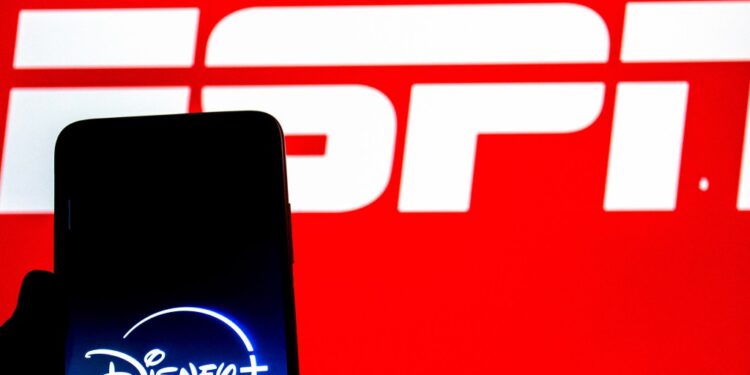Disney will add an ESPN tile to Disney+ on December 4, giving subscribers to its “trio” streaming bundle access to ESPN+ content when they are on Disney+.
The move, which was signaled by the company last spring, follows a similar initiative with Hulu earlier this year. It precedes the arrival of ESPN’s “flagship” streaming service, which will include the full suite of live programming from all ESPN networks. The projected date of that launch remains early fall of 2025.
While subscribers to the “trio” package combining Disney+, Hulu and ESPN+ will see the most benefit from the tile addition, Disney says it plans to make “select” ESPN programming available to all Disney+ subscribers.
CEO Bob Iger and CFO Hugh Johnston revealed the date of the ESPN tile addition in their executive commentary about the company’s fiscal fourth quarter. Earlier this morning, Disney released its quarterly numbers, with Disney+ adding 4.4 million new core subscribers over the prior quarter, topping 120 million. The streaming service launched nearly five years ago, on November 19, 2019.
The flagship experience within the ESPN app, Iger and Johnson said, will offer viewers “an enhanced array of innovative digital features, creating a sports destination unlike anything available in the marketplace today.”
The aim of the flagship rollout will be to reduce churn and increase engagement, opening up new advertising possibilities. On the ad front, execs said more than half of new subscribers to Disney+ are coming in through its ad-supported tier, which launched in December 2022.
Iger and Johnston said the addition of Hulu and ESPN tiles represents an effort to assemble on Disney+ “the ultimate collection of high-quality content for every member of the household.” As much as it has grown globally in the five years since its debut, Disney+ has been limited historically by the narrowness of its programming and the fact that some viewers only occasionally visit, as reflected in Nielsen’s monthly Gauge reports. Typically, Disney+ captures about one-third of Netflix’s share of viewing via a TV set, and also lags behind Amazon Prime Video.







